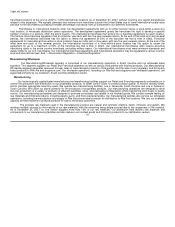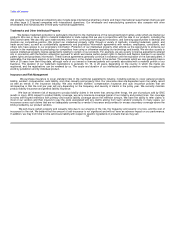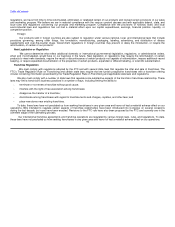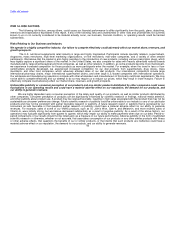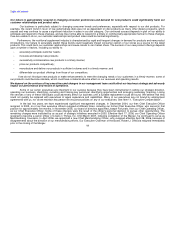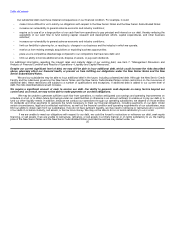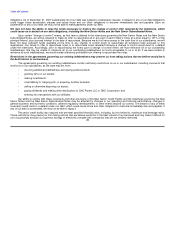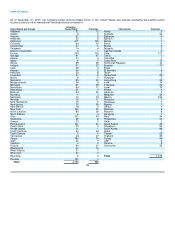GNC 2008 Annual Report Download - page 24
Download and view the complete annual report
Please find page 24 of the 2008 GNC annual report below. You can navigate through the pages in the report by either clicking on the pages listed below, or by using the keyword search tool below to find specific information within the annual report.
Table of Contents
In addition, Susan Trimbo resigned effective March 31, 2007 as our Senior Vice President of Scientific Affairs, Mark Weintrub resigned effective
September 30, 2007 as our Senior Vice President and Chief Legal Officer and Curt Larrimer resigned effective December 31, 2007 as our
Executive Vice President and Chief Financial Officer. Although the duties of Chief Financial Officer are being performed by J. Kenneth Fox,
Senior Vice President and Treasurer, we have not yet identified a permanent replacement for Mr. Larrimer. We will continue to enhance our
management team as necessary to strengthen our business for future growth. Although we do not anticipate additional significant management
changes, these and other changes in management could result in changes to, or impact the execution of, our business strategy. Any such
changes could be significant and could have a negative impact on our performance and results of operations. In addition, if we are unable to
successfully transition members of management into their new positions, management resources could be constrained.
Compliance with new and existing governmental regulations could increase our costs significantly and adversely affect our results of
operations.
The processing, formulation, manufacturing, packaging, labeling, advertising, and distribution of our products are subject to federal laws
and regulation by one or more federal agencies, including the Food and Drug Administration, or FDA, the Federal Trade Commission, or FTC,
the Consumer Product Safety Commission, the United States Department of Agriculture, and the United States Environmental Protection
Agency. These activities are also regulated by various state, local, and international laws and agencies of the states and localities in which our
products are sold. Government regulations may prevent or delay the introduction, or require the reformulation, of our products, which could
result in lost revenues and increased costs to us. For instance, the FDA regulates, among other things, the composition, safety, labeling, and
marketing of dietary supplements (including vitamins, minerals, herbs, and other dietary ingredients for human use). The FDA may not accept
the evidence of safety for any new dietary ingredient that we may wish to market, may determine that a particular dietary supplement or
ingredient presents an unacceptable health risk, and may determine that a particular claim or statement of nutritional value that we use to
support the marketing of a dietary supplement is an impermissible drug claim, is not substantiated, or is an unauthorized version of a "health
claim." See Item 1, "Business—Government regulations—Product regulation." Any of these actions could prevent us from marketing particular
dietary supplement products or making certain claims or statements of nutritional support for them. The FDA could also require us to remove a
particular product from the market. For example, in April 2004, the FDA banned the sale of products containing ephedra. Sale of products
containing ephedra amounted to approximately $35.2 million, or 3.3%, of our retail sales in 2003 and approximately $182.9 million, or 17.1%, of
our retail sales in 2002. Any future recall or removal would result in additional costs to us, including lost revenues from any additional products
that we are required to remove from the market, any of which could be material. Any product recalls or removals could also lead to liability,
substantial costs, and reduced growth prospects.
Additional or more stringent regulations of dietary supplements and other products have been considered from time to time. These
developments could require reformulation of some products to meet new standards, recalls or discontinuance of some products not able to be
reformulated, additional record-keeping requirements, increased documentation of the properties of some products, additional or different
labeling, additional scientific substantiation, adverse event reporting, or other new requirements. Any of these developments could increase our
costs significantly. For example, the Dietary Supplement and Nonprescription Drug Consumer Protection Act (S3546) which was passed by
Congress in December 2006, imposes significant new regulatory requirements on dietary supplements including reporting of "serious adverse
events" to FDA and recordkeeping requirements. Although regulatory requirements created by the new legislation will not become mandatory
until December 2007, this new legislation could raise our costs and negatively impact our business. In June 2007, the FDA adopted final
regulations on Good Manufacturing Practice in manufacturing, packaging, or holding dietary ingredients and dietary supplements, which will
apply to the products we manufacture. These regulations require dietary supplements to be prepared, packaged, and held in compliance with
certain rules. Although we will have until June 2008 to comply with these new regulations, they could raise our costs and negatively impact our
business. Additionally, our third-party suppliers or vendors may not be able to comply with the new rules without incurring substantial expenses.
If our third-party suppliers or vendors are not able to timely 20


